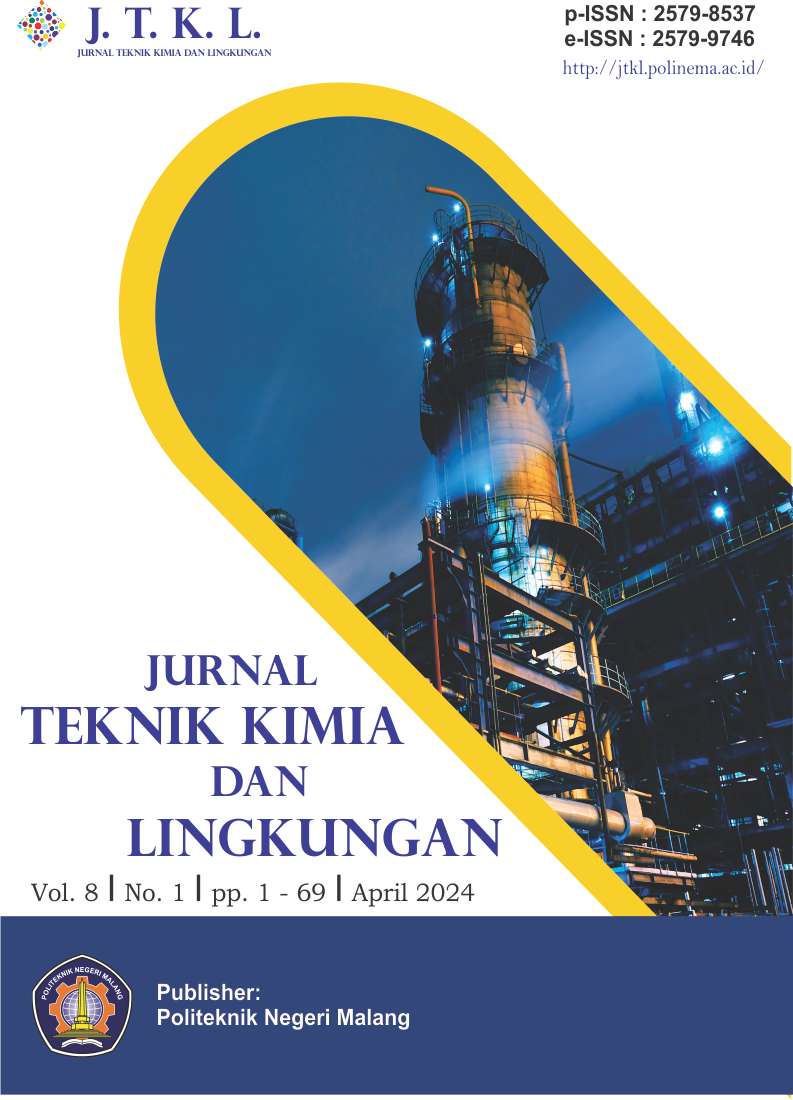Environmental Impact Evaluation of Tofu Production using Life Cycle Assessment
DOI:
https://doi.org/10.33795/jtkl.v8i1.5069Keywords:
LCA, simulations, tofu, wasteAbstract
Tofu is one of the products made from soybeans that a sizable portion of people in a larger society consume. There are several ways to make tofu, from conventional to modern. The conventional tofu production process generates a lot of waste. Many of the researchers have explored numerous strategies to handle tofu waste in a way that minimizes its harmful influence on the environment. However, in many cases, the environmental impact is simply transferred from one process to another during the treatment of tofu waste. As a result, the whole tofu-making process requires an evaluation of the effects. Among these approaches is life cycle assessment (LCA). The study discovered that energy use was the primary factor leading to environmental impacts. Burning firewood for energy resulted in 55.61 kg of carbon dioxide equivalent. The emission value has been reduced to 32 kg CO₂ eq and 28 kg CO₂ eq, respectively, according to the findings of simulations by utilizing biogas and natural gas as fuels.
References
M. Faisal, A. Gani, F. Mulana, H. Daimon, Treatment and utilization of industrial tofu waste in Indonesia, Asian Journal of Chemistry, vol. 28, no. 3, pp. 501–507, 2016.
L. Zheng, J. M. Regenstein, F. Teng, Y. Li, Tofu products: A review of their raw materials, processing conditions, and packaging, Comprehensive Reviews in Food Science and Food Safety, vol. 19, no. 6., pp. 3683–3714, 2020.
S. Hartini, A. N. Fatliana, N. U. Handayani, P. A. Wicaksono, B. S. Ramadan, T. Matsumoto, Life cycle assessment and life cycle cost of tofu production and its extended recycling scenario, Global Journal of Environmental Science and Management, vol. 10, no. 2, pp. 487–502, 2024.
I. S. Choi, Y. G. Kim, J. K. Jung, H. J. Bae, Soybean waste (okara) as a valorization biomass for the bioethanol production, Energy, vol. 93, pp. 1742–1747, 2015.
Y. Chen, F. Zhang, T. Wang, N. Shen, Z. W. Yu, R. J. Zeng, Hydraulic retention time affects stable acetate production from tofu processing wastewater in extreme-thermophilic (70°C) mixed culture fermentation, Bioresour Technol., vol. 216, pp. 722–728, 2016.
S. K. Wang, X. Wang, J. Miao, Y. T. Tian, Tofu whey wastewater is a promising basal medium for microalgae culture, Bioresour Technol., vol. 253, pp. 79–84, 2018.
Indagkop Kaltim, Sentra Industri Kecil Menengah Somber, https://indagkop.kaltimprov.go.id/index.php/halaman/detail/sentra-industri-kecil-menengah-somber (Acessed 21 Februay 2024).
A. P. J. Mol, P. Oosterveer, Certification of markets, markets of certificates: Tracing sustainability in global agro-food value chains, Sustainability (Switzerland), vol. 7, no. 9, pp. 12258–12278, 2015.
M. Z. Hauschild, R. K. Rosenbaum, S. I. Olsen, Life Cycle Assessment, Berlin: Springer, 2018.
N. A. A. Bakar, A. M. Roslan, M. A. Hassan, M. H. A. Rahman, K. N. Ibrahim, M. D. A. Rahman, R. Mohamad, Development of life cycle inventory and greenhouse gas emissions from damaged paddy grain as fermentation feedstock: A case study in Malaysia, J. Clean Prod., vol. 354, pp. 131722, 2022.
M. K. Alam, W. K. Biswas, R. W. Bell, Greenhouse gas implications of novel and conventional rice production technologies in the Eastern-Gangetic plains, J. Clean Prod., vol. 112, pp. 3977–3987, 2016.
S. Hartini, B. S. Ramadan, R. Purwaningsih, S. Sumiyati, M. A. A. Kesuma, Environmental impact assessment of tofu production process: Case study in SME Sugihmanik, Grobogan, IOP Conf. Ser.: Earth Environ. Sci., vol. 894, pp. 012004, 2021.
V. Azatri, R. Aziz, F. Goembira, Comparative Life Cycle Assessment (LCA) of two tofu industries that uses different energy sources for production processes, IOP Conf. Ser.: Earth Environ. Sci., vol. 1268, pp. 012045, 2023.
A. Mejia, H. Harwatt, K. Jaceldo-Siegl, K. Sranacharoenpong, S. Soret, J. Sabaté, Greenhouse Gas Emissions Generated by Tofu Production: A Case Study, J. Hunger Environ. Nutr., vol. 13, no. 1, pp. 131–142, 2018.
L. Vandepaer, J. Cloutier, B. Amor, Environmental impacts of Lithium Metal Polymer and Lithium-ion stationary batteries, Renewable and Sustainable Energy Reviews, vol. 78, pp. 46–60, 2017.
R. di Filippo, O. S. Bursi, R. di Maggio, Global warming and ozone depletion potentials caused by emissions from HFC and CFC banks due structural damage, Energy Build, vol. 273, pp. 1-39, 2022.
M. Z. Hauschild, M. A. J. Huijbregts, Life Cycle Impact Assessment, in LCA Compendium – The Complete World of Life Cycle Assessment, Berlin: Springer, 2015.
L. Barton, T. Thamo, D. Engelbrecht, W. K. Biswas, Does growing grain legumes or applying lime cost effectively lower greenhouse gas emissions from wheat production in a semi-arid climate?, J. Clean Prod., vol. 83, pp. 194–203, 2014.
H. H. E. van Zanten, P. Bikker, H. Mollenhorst, B. G. Meerburg, I. J. M. de Boer, Environmental impact of replacing soybean meal with rapeseed meal in diets of finishing pigs, Animal, vol. 9, no. 11, pp. 1866–1874, 2015.
Downloads
Published
Issue
Section
License
Copyright (c) 2024 Rizka Lestari, Dian Rahmawati, Khairul Nadiah Binti Ibrahim

This work is licensed under a Creative Commons Attribution-NonCommercial 4.0 International License.







